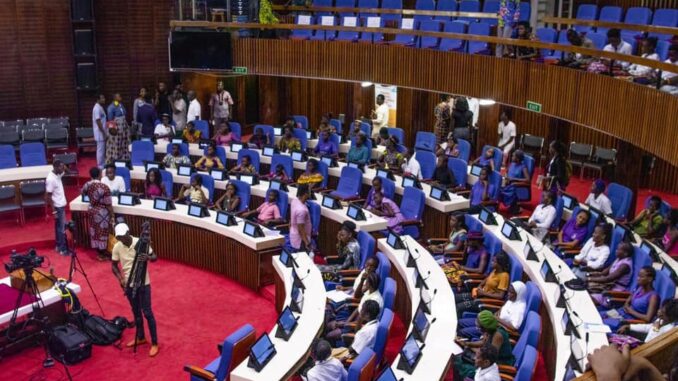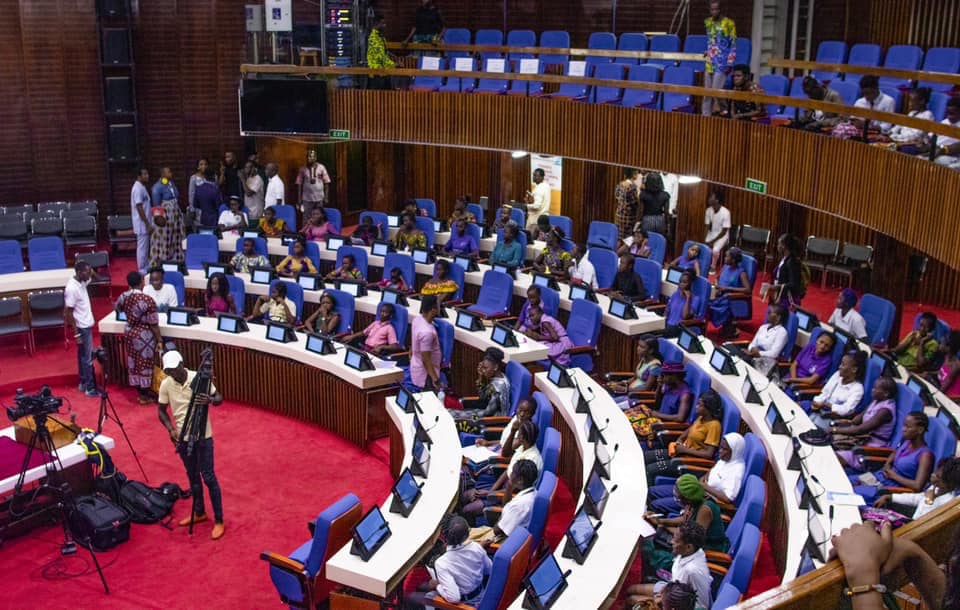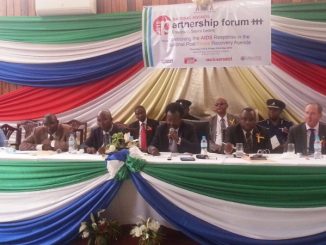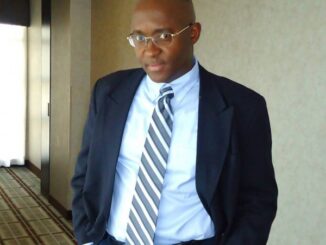
*Justice | Law | Rights*
🇸🇱⚖ *LEGAL LINK*🇸🇱
+23279167457 | +23288646294
89 Fort Street
Freetown | Sierra Leone
11th July, 2022*ADVISORY OPINION*
*MAKING THE CASE FOR A CONTINUATION OF THE FIRST PAST THE POST ELECTORAL SYSTEM IN SIERRA LEONE*
*Introduction*
Sierra Leone’s electoral system for the conduct of Parliamentary
elections has largely revolved around two types; *the First Past the Post and that of Proportional Representation* otherwise known as District Block System.The 1991 Constitution of Sierra Leone under section 38 (1) makes the First Past the Post electoral system as the mandatory rule for the conduct of Parliamentary elections by the Electoral Commission of Sierra Leone and the country has implemented same in three successive democratic elections namely 2007, 2012 and 2018 elections.
But notwithstanding however, Proportional Representation has also been made use of in Sierra Leone at least in two democratic elections namely 1996 and 2002 elections.
*By section 38 (A) (1) of the Constitutional Amendment of 2001, Proportional Representation was made part of our electoral system as a default option to be resorted to only where “a date for a general election of members of Parliament has been appointed but constituencies have not been established in accordance with subsection 3 of section 38 of the 1991 constitution for the purpose of such election.”*
This Constitutional Amendment, introduced during Sierra Leone’s war period was justifiable since there was an acute absence of credible data and many areas of the country remained inaccessible at the time
for the delimitation of constituencies and wards. Hence, the basis for which the Proportional
Representation system was introduced in the 1996 and 2002 elections respectively.Today, in 2022, just about 10 months to the 2023 general elections, members of Parliament,
particularly those in the ruling government party are pushing for the re-introduction of the Proportional
Representation system to be the modus operandi for the conduct of Parliamentary elections in 2023.The Opposition on the other hand are pushing against it on the grounds of procedure and suitability.
But whatever the arguments may be, this Advisory opinion seeks to provide a critical analysis of the
Proportional Representation system as against the First- Past the Post electoral system and concludes
by making a strong case as to why the First Past the Post electoral system is perhaps the better of the two evils in the conduct of Parliamentary elections in Sierra Leone.*To start with, the First Past the Post system is a voting method or electoral system in which the citizens of a constituency cast their votes for their candidates and the candidate with the majority of votes wins the elections.*
*On the other hand, a Proportional Representation system (PR system) is a voting method or an electoral system in which citizens cast their votes to the political parties and seats are allocated to the contesting parties according to the voting strength they possess.*
Proponents of the PR System have argued that it allows for more than one candidate to be selected from a constituency since political parties get seats in proportion to the votes polled by them.They also advance other advantages such as it makes for social cohesion, non-violence elections, non-wastage
of resources and allows for minority parties to be represented in Parliament.Notwithstanding the above seeming advantages however, a deep introspective analysis of the First
Past the Post system will reveal that these so called advantages of a PR system are more apparent than real.For example, while the PR system puts the party above the people, the most outstanding merit of the First Past the Post system is that it puts the people at the centre of the electioneering process.That is,
the citizens cast their votes for the candidate of their choice.They participate directly in the process of determining their representatives and further hold them to account where they fall short of their expectations.Through the First Past the Post system, citizens know the candidates they vote for and could always keep them on their toes.*Unfortunately, such is fundamentally lacking in a PR system as the party determines the candidates based on a list system and not the citizens.* Hence, representatives
cannot be known by the citizens nor can they be directly held to account by them. This disconnect
between the people and their representatives is perhaps the strongest and most compelling reason why LEGAL LINK prefers the First Past the Post system as against the PR system.*Secondly, Unlike the PR system, Independent candidates are guaranteed a secured space to contest under the First Past the Post system when they feel cheated or marginalized by their parties. This was evident in the 2018 elections where independent candidates did contest and win seats in Parliament
without any support from the parties they resigned from. Providing such an alternative route is key
especially in terms of attaining the peoples will and suppressing corruption under the First Past the Post system.Conversely, no room is created for Independent candidates to contest under the PR System if
their names are not put on the list or are placed below the list or are even outrightly rejected. In a PR system, the party’s decision reigns supreme and an aggrieved candidate must learn to leave with it irrespective
of how he or she feels.In the 1996 and 2002 elections in Sierra Leone, which were done under the PR system, no independent candidate took part in the parliamentary elections thus underscoring the point raised above. Even though it has been rumored that the PR system that will be introduced by NEC (now ECSL) will consider Independent Candidates, in the opinion of LEGAL LINK, this is just a
decorated rumor and mere sweet talk by ECSL and should be taken as such.If this was the case, then it would have long happened in the 1996 and 2002 elections.Furthermore, the argument that the First Past the Post system does not create room for minority party
representation is also fallacious and misleading.This is so because, from the 2018 Parliamentary result
statistics, we note that minority parties as well as Independents are currently represented in Parliament.If the above argument was true, why did this happen? As a matter of fact also, these parties (NGC and C4C) were new parties contesting for the very first time and winning seats in both the APC and SLPP strongholds. This certainly underscores the point that the First Past the Post system makes room for minority parties and independent voices.Also, the claim that unlike the First Past the Post system, the PR System attracts little or no violence during elections cannot only be disillusioned but a mere utopian dream. In the view of LEGAL LINK,
electoral violence occurs as a result of selfish politicians and party operatives who stoke violence and rhetorics in elections as well as the failure of the state security system to effectively police public
elections. It has nothing to do with the type of electoral system being practiced.*For example, when there was genuine will and commitment by political parties, election management bodies and the state security apparatus to ensuring a non – violent and peaceful By-elections at Samai Bendugu, it is on
record to be one of the most peaceful and orderly By-elections conducted by ECSL in recent times.*But when these parties and election management bodies choose not to do the same in the cancelled Constituency 110 elections, that election is on record to be one of the worse elections in the history of Sierra Leone in terms of electoral violence and ballot stuffing.**Hence, LEGAL LINK wishes it to be known that electoral violence is never the making of an electoral system but rather a failure of political parties to play by the rules and the neglect of state institutions to police the elections professionally and hold perpetrators to account.*
Moreover, antagonists of the First Past the Post system also decry it on the grounds that it weakens social cohesion, entrench stronghold loyalty, increased political tensions, bickering and animosity as a result of the intense competition and winner take all features that is prevalent under such a system.
Contrary to the above, it is claimed that the PR system makes for social cohesion, unity and a cohesive society.This cannot be more misleading and father form the truth.*In the opinion of LEGAL LINK, social cohesion, peace and cohesiveness cannot be a deliverable of an electoral system but rather an outcome of good laws, policies and* *programmes that encompasses respect* *for human rights, rule of law, independent and impartial judiciary, fair and equitable distribution of the resources, mature political culture, tolerance, independent institutions and accountability for police brutality to name but a few.And for such to be ensured, the Executive Arm of government has a greater role to play in ensuring same.*
The argument that PR enhances women’s quota and representation in Parliament more than the First Past the Post is the most laughable of all arguments. If this was true, then in 1996 and 2002 elections, Sierra Leone would have easily attained the 30% quota for women in parliament.
In debunking this
misrepresentation however, LEGAL LINK maintains that, it is even likely that women’s representation on the List generated by the party under the PR system may be minuscule or women candidates may be neglected or placed far below in the list which might impede their chances of making it through.Conversely, the possibility may even exist for many women candidates to be given symbols under the
First Past the Post system to contest in strongholds that will make their victory a sure win. In our opinion therefore, this issue about increasing women representation rests on the willingness of the
leadership and executive members of the Party as well as the passing of affirmative action laws by the Executive and Parliament to increase women representation than an electoral system.With respect to the argument that First Past the Post makes for wastages of resources particularly in the conduct of By-elections, our response is that to seek the genuine mandate of the people by allowing them to have a direct say in the determination of those that will ultimately represent them can never be a waste of resources. *No price is too high to pay in the practice of democracy.The people’s direct involvement in electing their representatives is in fact the soul of democracy and any resources spent to achieving that goal is justifiable and reasonable in the circumstances.* That’s why they pay taxes and it is reasonable for the people to put their mouth where their money is!
More negative still, under the PR system, there are too much complexities and formulas to grapple with thus creating confusion and apathy for the electorate. As it stands at the moment, even the proponents
of the PR system are yet to agree on the type of formula and specie of PR system that could be
adopted.With little time remaining for the 2023 elections coupled with less public education and consultations to agree and sell these formulas out to political parties and the public, an introduction of the PR system at this time will certainly lead to a boomerang.Corruption also looms large under the PR system especially in determining which candidate gets to the list
and who stays on top of the list.*This therefore puts so much power in the hands of political parties and exposes then to tyranny, corruption and dictatorship rule, paving way for inter- party conflicts, bickering and backstabbing to take place.* This is however not to suggest that there is no corruption in the First Past the Post system.The safeguard however is that under the First Past the Post, an
aggrieved candidate deprived of a symbol by corrupt means can resign and stand as an independent candidate in the election.They may even end up winning the seat as was the case with some of the
current independent Parliamentarians in Parliament.Also, where corruption festers in the award of symbols, often times, such candidates are rejected by the electorate in favour of other party candidates as a way of checkmating the excesses of the party executive.*This is true in the case of the election of Hon Tawa of the SLPP.* Such fallback position to check party excesses is lacking in a PR system.
Significantly however, LEGAL LINK believes that *the biggest obstacle towards the actualization of the PR system in the forthcoming 2023 elections is the fact that* *by section 38 (1) of the 1991 constitution, Sierra Leoneans have already preferred the First Past the Post system as the rule and mandatory electoral system for the conduct of Parliamentary elections in the country.*
The PR system, by section 38 A (1) of the 2001 Constitutional Amendment Act remains the exception and can only be invoked where a date for the general elections of members of Parliament has been appointed but no constituencies exist.
Bearing this in mind, it is therefore important to emphasize that in Sierra Leone today, constituencies and
Wards do exist and there are also census data for the conduct of the general elections. It therefore renders the applicability of the 2001 constitutional amendment redundant and superfluous.*Any attempt therefore by Parliament to invoke the 2001 constitutional amendment exception as the rule will amount to a modification and / alteration of the constitution which may thus require a Constitutional Amendment Bill to be passed with two thirds of the House voting in favour. As it stands in the House at the moment, no one party can poll two thirds majority without support from all of the other parties in the house.* Hence, it is highly unlikely for the ruling government to get this deal done especially in the face of outright condemnation of the PR system by the main opposition party.
In conclusion, LEGAL LINK holds the view that despite its liking for the First Past the Post system which appears to be the lesser of the two evils as it puts people above parties, *none of the above electoral systems can on its own comprehensively address the underlying rhetoric and nuances that underpin our democratic system and electioneering process.*
*If a cohesive society is to be maintained, sustainable outcomes ensured and election violence eradicated in our electioneering*
*process, it will require a change of political culture, an investment by the Executive Arm of government into social goods, infrastructure, tolerance, inclusive governance, respect for* *human rights, rule of law, independent and impartial judiciary, fair and equitable distribution of the resources, holding of free, fair and credible elections, existence of independent institutions and ensuring accountability for police brutality*.These are certainly the true parameters and enablers that will make for social cohesion and a peaceful and cohesive Sierra Leone.; not a PR system.*Faithfully Submitted*
*Rashid Dumbuya Esq*
*Executive Director of LEGAL LINK and Former Commissioner for Human Rights in Sierra Leone**On behalf of the LEGAL LINK TEAM*
ABOUT LEGAL LINK*
*Christian Lawyers Centre (a.k.a LEGAL LINK) is a non-profit legal advocacy group comprising of lawyers, law students and human right activists that seeks to provide legal assistance to religious communities as well as vulnerable groups in Sierra Leone through legal advocacy, education and training, public interest litigations, state and private sector accountability, enforcement of the rule of law and ensuring respect for domestic and international laws that guarantee fundamental human rights and freedoms.*
For more information, contact us at:
*No. 89 Fort Street, Off Circular Road, Freetown, Sierra Leone, West Africa*
*Email:* [email protected]
*Tel:* +23279167457 / +23288646294
*Website:* www.legallinksierraleone.org




